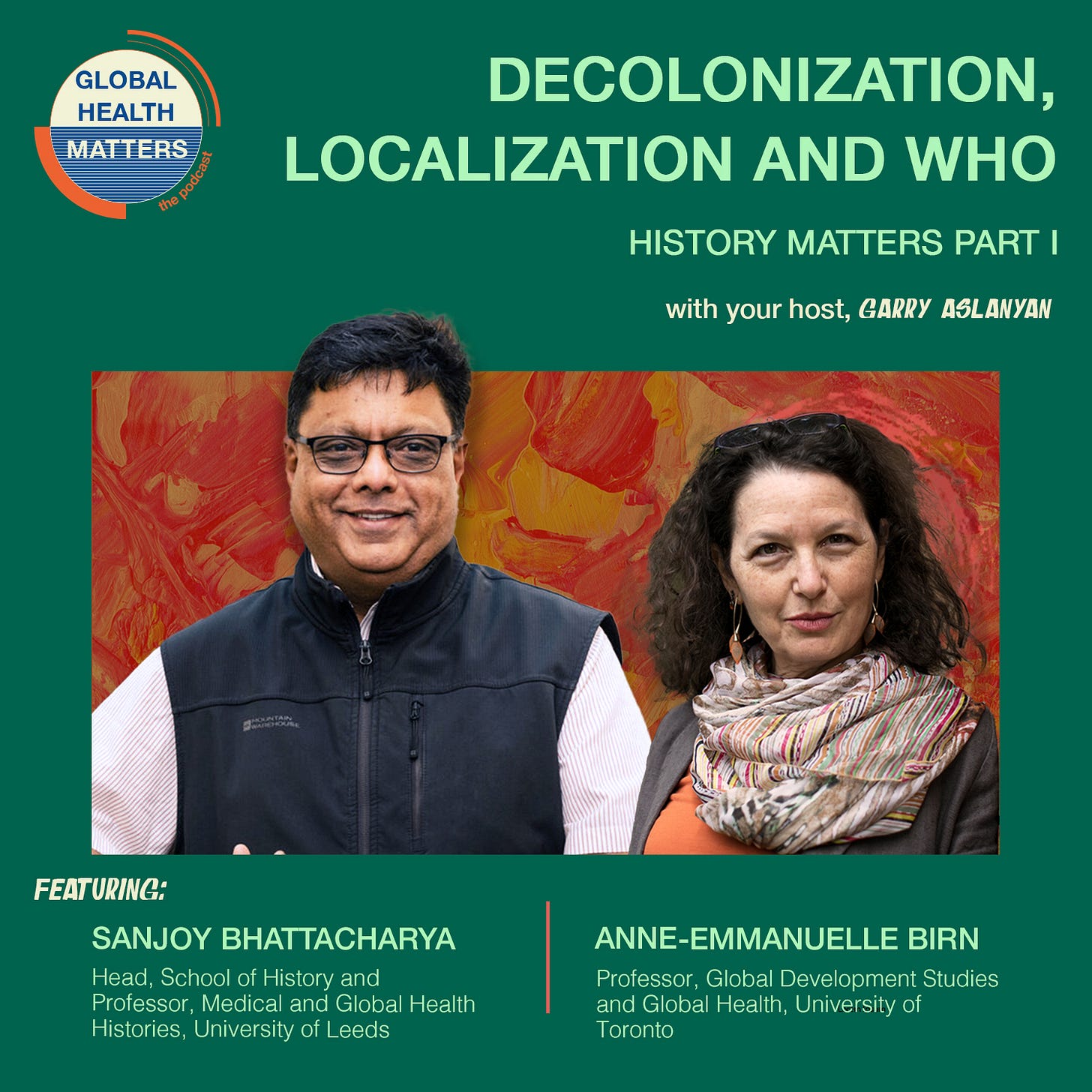Hi,
Today we bring you a recent editorial I wrote on the future of multilateralism in global health, for the newSpecial magazine. We republish the piece here for our readers.
You can pick up a print copy of the May issue if you are in Geneva, at WHO or at the Palais des Nations. Edited by Garry Aslanyan, this collectible edition from newSpecial focused on global health can also be downloaded here.
The genesis of this editorial was a free-wheeling conversation with a diplomat here in Geneva, on what global health multilateralism can look like ten years from now. It really set me thinking. As a relative newcomer to the field, having been reporting and writing on this for the last few years, I still have a certain degree of optimism left, unlike my some of my more seasoned colleagues in the space! It is hard to say at this point whether this optimism is justified. We hope you like this editorial. Let me know your thoughts?
We also have a small update on the WTO General Council meeting this week in Geneva. This followed WHO’s revoking COVID-19 as a PHEIC late last week.
Watch out for our exclusive edition in the coming days.
Like our work? Consider supporting our journalism that ensures nuance, detail, and accuracy. Readers paying for our work helps us meet our costs. Thank you for reading.
Until later!
Best,
Priti
Feel free to write to us: patnaik.reporting@gmail.com or genevahealthfiles@protonmail.com; Follow us on Twitter: @filesgeneva
I. EDITORIAL
The Future of Multilateralism in Global Health
Global health governance is at the cusp of a transition.
The pandemic of COVID-19 had provided an opportunity for countries to put to test the strength of multilateral decision-making. The pervading inequities in the response and recovery from the pandemic has shown that the international community has spectacularly failed the multilateralism test. But as a result, it has changed diplomacy and governance questions forever.
No where is this more evident than in the on-going negotiations at the World Health Organization, where countries have come together to negotiate new rules in the governance of health emergencies and in the discussions on the amendments to the International Health Regulations (2005). And this in my view, is a renewed opportunity to push the boundaries, or indeed secure the fundamentals of multilateralism in global health.
But as before, the possibilities for strengthening multilateralism in global health is being, and will be dictated by, current realities and forces outside of global health.
WHY MULTILATERALISM IS FAILING?
There are multiple reasons why multilateralism in global health has been under challenge. From prevailing economic structures to the rise of transnational corporations, from the rising influence of philanthropists at national and international levels to the systematic dismantling of public funded health systems – these underlying factors have affected decision-making at international levels.
Emergence of other forums of decision-making, made up of a smaller group of countries have also skewed the way global health issues are discussed and governed. The nature of international cooperation has changed, not only because of geopolitics, but also because of the rise bilateral and regional interests among countries.

WHY MULTILATERALISM NEEDS TO SUCCEED?
COVID-19 has showed that complex challenges such as pandemics and the climate crises that respect no borders, will need true international cooperation and a functional multilateral system in decision-making.
The onus of making multilateralism work lies on all countries, and other powerful stakeholders that have impinged on this space.
Countries must make space for democratic engagement at not only international levels but also national levels. Policy space for countries must be protected from commercial and private interests when governing health matters. A blatant and one-size-fits-all approach to “multistakeholderism” that treats private interests at par with people’s interests represented by civil society groups, affects this policy space. In time, this begins to eat into the possibilities in multilateral governance.
For multilateralism to work, and to solve multifaceted challenges, there needs to be a new social contract between and within countries. This will not be possible if governments everywhere ascribe to short-termism and protect status quo without attempting radical changes in the way some of these issues have been governed.
WHAT IS IN STORE?
The climate for multilateralism in global health does appear bleak. However, there are openings and possibilities that countries can explore and expand. The onus is on all member states, but more so on those who have the luxury of leading and shaping other exclusive forums such as the G7 and the G20.
To be sure, this is a challenge not only for WHO member states, but one that will continue to need support from democratic forces including robust civil society participation, expanded diverse decision-making rooted in decolonial framings, and in the mutually supportive roles of other powerful global health agencies. Many believe that for multilateralism in global health to succeed in Geneva, the process must begin at the national and regional levels. To an extent, Geneva is a reflection on impulses and impetus from capitals. The answers to the concerns on multilateralism may lie beyond the immediate confines in Geneva.
CURRENT NEGOTIATIONS IN GLOBAL HEALTH
Despite the diverse and complex motivations of various countries in the on-going negotiations in global health, it appears that it may offer opportunities for multilateralism to succeed. For one, the aspiration for better “global health security” may be a powerful factor in catalysing a consensus forged by multilateral decision-making. This is notwithstanding the top-down imposition of the concept of global health security – that has now effectively been embraced even by developing countries.
Ultimately, by way of these negotiations countries may begin to find shared visions to make the world a safer and a healthier place. And even if this means small steps to address the inequities in the access to medical products, or in the investments in health systems, these efforts could collectively contribute to an overall progress in the way countries come together to find solutions to problems that affect everybody.
At stake are the lives, health, and futures of those left behind. Saving multilateral decision-making in global health is a compulsion not an aspiration for international cooperation.
A number of successes have been cited as proof that the world can come together, whether it is signing up to achieve the sustainable development goals, or numerous international treaties. Global health has the potential to demonstrate that multilateralism in decision-making is worth saving.
First published by newSpecial: May 2023 issue
II. PODCAST CORNER
Decolonization, localization and WHO
In this episode we explore the multifaceted history of global health and how the narratives borne out of colonization, geopolitical events, and national ownership of public health inform policy and practices today. Among the narratives is that of the World Health Organization, which is celebrating its 75th anniversary this year.
Host Garry Aslanyan navigates global health history with two guests.
Sanjoy Bhattacharya considers the decolonization of global health and the democratic founding of WHO, which holds great promise for WHO’s future.
Anne-Emanuelle Birn speaks about the evolution of global health and the rise of other key players that are shaping the health agenda.
This is the first of our history matters episodes that we will bring to you during this season of Global Health Matters.
Listen here
Garry Aslanyan is the host and moderator of the Global Health Matters podcast. You can contact him at: aslanyang@who.int
This podcast promotion is sponsored by the Global Health Matters podcast.
If you wish to promote relevant information for readers of Geneva Health Files, for a modest fee, get in touch with us at patnaik.reporting@gmail.com.
III. POLICY UPDATES
WHO Director-General's opening remarks at the media briefing – 5 May 2023
The WHO DG terminated the Public Health Emergency of International Concern in relation to the COVID-19 pandemic, in accordance with the IHR, and issues revised Temporary Recommendations for the transition period.
Statement on the fifteenth meeting of the IHR (2005) Emergency Committee on the COVID-19 pandemic
DG Okonjo-Iweala: Delivering meaningful development outcomes key to successful MC13
WTO GENERAL COUNCIL UPDATE [May 8-9]
WTO members met this week for a General Council meeting, which among other agenda items also considered the TRIPS decision with respect to the extension to COVID-19 tests and treatments beyond vaccines.
Recall that paragraph 8 of the Ministerial Decision on the TRIPS Agreement, from June 2022, WTO members had agreed to make a decision within six months, on whether to extend the decision to cover the production and supply of COVID-19 diagnostics and therapeutics. That deadline expired on December 17, 2022.
Geneva-based trade sources indicated that a number of delegations took the floor this week suggesting keen interest on the subject. The US updated the meeting on the internal investigation underway at the US International Trade Commission. As many as 141 written submissions were by the Commission.
It is also understood that US-ITC officials are scheduled to visit Geneva in June, according to sources in Geneva.
(See our deep dive from last week: Fear-Mongering on Threatened Incentives to Innovation Dominate US-ITC Hearings, Activists Pick Apart Narratives [Update on WTO Waiver Extension Decision for COVID Tests & Treatments])
Proponents for the waiver and for the extension, emphasized the importance and the urgency of the decision, given the prevailing infections from COVID-19 in many parts of the world. They suggested that despite WHO’s recent decision on revoking COVID-19 as a Public Health Emergency of International Concern, there is an urgency to address the disease.
Previously stated positions were held by countries like Switzerland, sources said.
It is understood that Chinese Taipei reportedly questioned the need for a waiver for COVID-19 vaccines given WHO’s recent decision. Sources suggested that not only did they argue against an extension of the June 2022 TRIPS decision to tests and treatments, they also questioned whether there was a need for a waiver for the production of vaccines.
The World Health Assembly meets later this month, where countries will also discuss pandemic preparedness, prevention and response.
IV. WHAT WE ARE READING
News
Reform or die? If the US gets its way, the WTO might do both: Politico
Is Covid really over? WHO’s announcement sounds more like surrender than victory The Guardian
WHO and tobacco control partners urge countries not to partner or work with the tobacco industry: WHO
WHO dismisses lead COVID origins investigator for sexual misconduct Reuters
U.S. Loses Key Case on Rights to H.I.V.-Prevention Drugs: New York Times
Next UN climate summit to consider health issues in depth for first time: The Guardian
Despite Hosting mRNA Hub, South Africa Buys Vaccines From India – Highlighting Tension Between Price Pressures and Local Production Health Policy Watch
The real reason Europe’s medicines industry is dying Politico
Global health must evolve beyond its reliance on humanitarian aid Harvard Public Health
Rethinking Financial Estimates for Pandemic Preparedness and Response Thinking Global Health
Research
The WHO’s 75th anniversary: WHO at a pivotal moment in history British Medical Journal
What's the ideal World Health Organization (WHO)? Health Economics, Policy and Law
The Pandemic Fund—towards equitable financing for pandemics The Lancet
A WHO pandemic instrument: substantive provisions required to address global shortcomings The Lancet
Where Does Global Health Funding Come From and Where Does It Go? South Centre
V. NOTABLE TWEET
Global health is everybody’s business. Help us probe the dynamics where science and politics interface with interests. Support investigative global health journalism.






